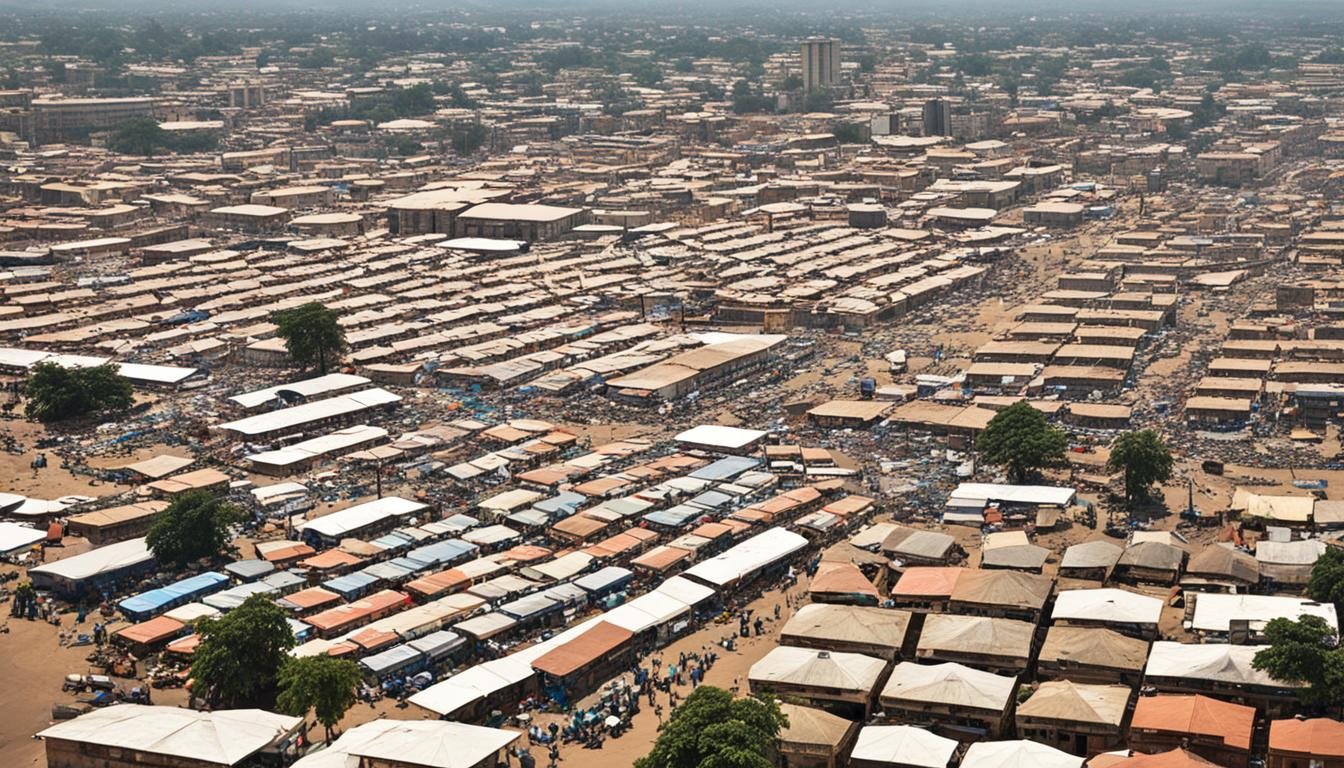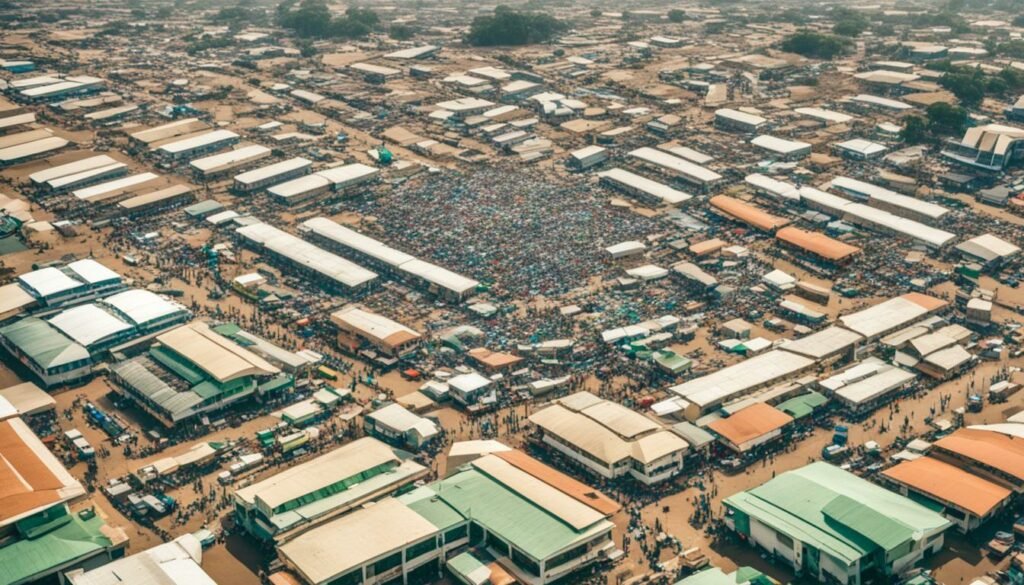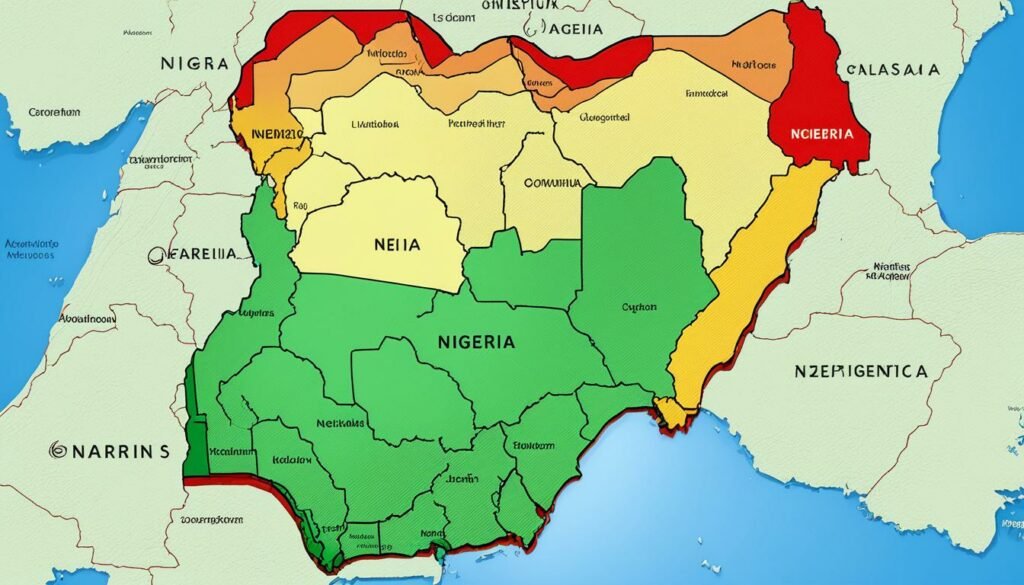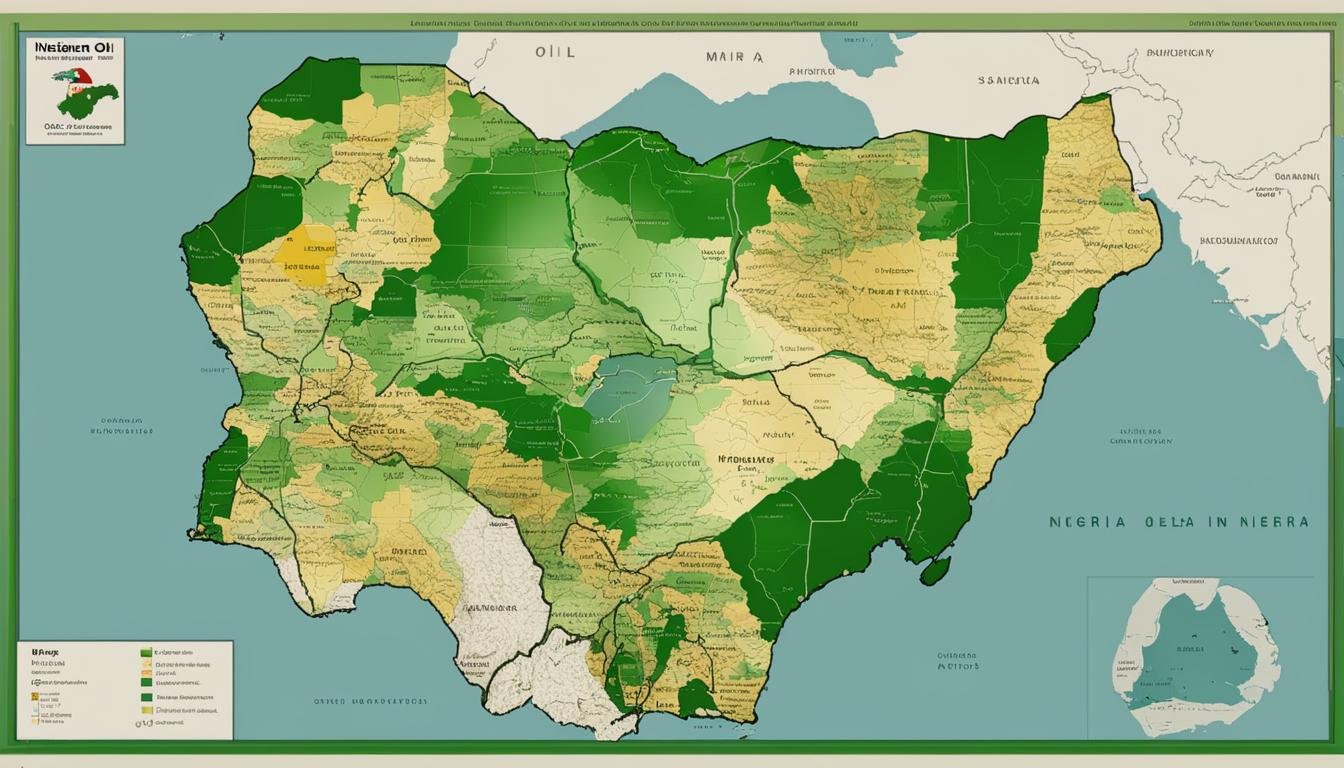In Nigeria, the governing system is structured into three tiers: federal (central), state, and local government. I will be focusing on the local government aspect. Local government areas (LGAs) form an essential part of Nigeria’s governance at the grassroots level. You might be wondering, how many local governments are there in Nigeria?
As of now, there are a total of 774 LGAs in Nigeria. This includes 768 local government authorities and 6 area councils in the Federal Capital Territory (FCT) of Abuja. These local governments play a significant role in ensuring the delivery of basic services and governance to the local communities they represent.
Key Takeaways:
- Nigeria has a federal system of government with three tiers: federal, state, and local government.
- There are currently 774 local governments in Nigeria, including 768 local government authorities and 6 area councils in Abuja.
- Local governments are responsible for delivering basic services and governance at the grassroots level.
- Each local government area in Nigeria is headed by a local government council.
- The number of local governments in each state varies depending on population size and geographical area.
An Overview of Nigeria’s Governing Framework
Nigeria operates under a federal republic system of government, consisting of the federal, state, and local government levels. This governing framework is designed to ensure a distribution of power and responsibilities across the country. At the federal level, Nigeria is led by a president who serves as both the head of state and the head of government. Each state within Nigeria has its own governor and state assembly, giving them a level of autonomy in decision-making and governance.
Understanding Nigeria’s Federal Republic System
In Nigeria’s federal republic system, power is shared between the central (federal) government and the state governments. The central government is responsible for matters of national importance, while the state governments have the authority to regulate and manage affairs within their respective states. This division of power fosters collaboration and enables governance to be more responsive to the needs and aspirations of the Nigerian people.
The Role of Local Governments in Nigeria’s Democracy
Local governments in Nigeria play a vital role in the country’s democratic system. They are tasked with delivering basic services and governance at the grassroots level, ensuring that the needs of local communities are met. Local governments are responsible for implementing development projects and programs within their respective local government areas (LGAs), which are the primary administrative divisions of Nigeria.
By decentralizing governance and bringing it closer to the people, local governments promote citizen participation and empowerment. They are instrumental in ensuring that government initiatives are effectively implemented and that resources are allocated equitably to benefit all Nigerians. Local government councils in Nigeria are essential in driving socio-economic development and improving the overall well-being of communities.
Continue reading: Exploring the Number and Distribution of Local Governments in Nigeria
How Many Local Governments in Nigeria
Exploring the Number and Distribution of Local Governments in Nigeria
Nigeria is made up of 774 local government areas (LGAs) that are spread across the country. These LGAs play a crucial role in the governance and service delivery at the grassroots level. Each LGA is further divided into wards, with each ward being represented by a councillor who advocates for the interests of the local community.
The number of LGAs in each state varies based on factors such as population size and geographic area. For example, Lagos State, which is the most populous state in Nigeria, has 20 LGAs, while Kano State has 44 LGAs. The distribution of local governments across the country is aimed at ensuring effective governance and service delivery to all regions.
To give you a better understanding of the number of local governments in Nigeria, here is a table showcasing the states with the highest and lowest number of LGAs:
| State | Total Number of LGAs |
|---|---|
| Lagos | 20 |
| Kano | 44 |
| Ekiti | 16 |
| Taraba | 16 |
| Bayelsa | 8 |
| Federal Capital Territory (Abuja) | 6 |
This table provides a glimpse into the diverse number of LGAs in different states, showcasing the varying levels of local government representation and administration across Nigeria.
Next, we will explore the functions and responsibilities of local governments in Nigeria, shedding light on the important role they play in delivering essential services and promoting grassroots development.
Exploring the Local Government Administration in Nigeria
The local government administration in Nigeria plays a crucial role in the overall governance and development of the country. Nigerian local government authorities are responsible for a wide range of functions and responsibilities, ensuring the welfare and well-being of the local population.
The Functions and Responsibilities of Local Governments
Local governments in Nigeria have specific functions and responsibilities as mandated by the constitution. These functions include:
- Providing basic social amenities such as education, healthcare, and clean water to the local population.
- Maintaining roads and infrastructure within their respective local government areas.
- Collecting taxes and levies to generate revenue for local development projects.
- Promoting economic development by attracting investments and creating employment opportunities.
- Ensuring the welfare and well-being of the local population, including social welfare programs.
The local government administration in Nigeria plays a vital role in bringing governance and services closer to the people, especially in rural areas. By focusing on grassroots development, local governments contribute to the overall growth and progress of the nation.
Composition and Elected Officials within Local Governments
The composition of local governments in Nigeria includes elected officials who are responsible for the administration of their respective local government areas. The key elected officials within local governments include:
- Chairman/Chairperson: The head of the local government who oversees the overall administration and governance of the LGA.
- Councillors: Representatives of the wards within the local government who advocate for the interests of their constituents.
- Vice Chairman/Vice Chairperson: Supports the chairman in their duties and responsibilities.
These elected officials work together to ensure the efficient and effective functioning of the local government administration in Nigeria. They collaborate with various stakeholders, including government agencies, community leaders, and residents, to address local issues and promote development.
| Local Government | Headquarters | Functions |
|---|---|---|
| Lagos State | Ikeja | Education, healthcare, infrastructure development, revenue collection |
| Kano State | Kano | Education, healthcare, infrastructure development, social welfare |
| Rivers State | Port Harcourt | Education, healthcare, revenue collection, environmental management |
| Ogun State | Abeokuta | Education, healthcare, infrastructure development, agriculture |
The table above provides examples of local governments in Nigeria, their headquarters, and some of their key functions. It showcases the diverse roles that local governments play in ensuring the well-being and development of their respective areas.
The Geographic Spread of Local Governments Across Nigeria
Local governments play a vital role in Nigeria’s governance and service delivery at the grassroots level. They are spread across all states in the country, ensuring that each area has representation and access to local decision-making processes.
The geographic spread of local governments reflects Nigeria’s administrative divisions, which are designed to promote effective governance and service delivery. The country follows a hierarchical structure, with the federal government at the top, followed by the state governments, and finally, the local governments.
The local government system in Nigeria is an essential part of the Nigerian government hierarchy. It helps distribute power and responsibilities, ensuring that the needs and concerns of local communities are addressed. The presence of local governments in every state allows for localized governance and tailored solutions to local challenges.
As shown in the image above, local governments are spread throughout Nigeria, encompassing both urban and rural areas. This widespread distribution helps enhance public participation and democratic decision-making at the grassroots level.
The administrative divisions in Nigeria, represented by the local government areas, allow for the efficient delivery of essential services, such as education, healthcare, and infrastructure development. They also facilitate effective implementation of government policies and programs tailored to the needs of different regions.
Overall, the geographic spread of local governments in Nigeria is a testament to the country’s commitment to decentralization and grassroots governance. It ensures that no area is left behind and that all citizens have access to basic services and democratic representation.
The Electoral System and Representation in Nigerian Local Governments
Diverse Electoral Schedules and Terms of Office
Local government elections in Nigeria play a crucial role in determining the representatives who will govern at the grassroots level. However, these elections are not conducted simultaneously throughout the country. Instead, they are held at different times and have varying terms of office depending on the state.
In some states, local government elections are conducted concurrently with state and national elections. This approach ensures that citizens have the opportunity to vote for their representatives at all levels of government in a single election cycle. On the other hand, there are states that hold separate electoral schedules for local government elections, allowing for focused attention on local issues and candidates.
The elected officials in Nigerian local governments include the chairperson, councillors, and vice chairpersons. Their roles are vital in overseeing the administration and governance of the local government areas. They work together to make decisions, implement policies, and address the needs of the local population. However, the terms of office for these positions also vary depending on the state, further adding to the diversity of the electoral landscape.
Women’s Representation in Local Government Elections
Nigeria has made efforts to promote gender equality and women’s representation in various levels of government, including local governments. However, despite these efforts, the percentage of women elected to local government positions in Nigeria remains low. This underrepresentation raises concerns about inclusivity and the full participation of women in the decision-making processes at the grassroots level.
Efforts are being made to address this gender imbalance in local government elections. Advocacy groups and organizations are working to increase awareness, mobilize support, and build capacity among women interested in running for local government positions. Additionally, there are initiatives to provide training and mentorship programs to equip women with the necessary skills and knowledge to excel in the electoral process.
By encouraging increased women’s representation in local government elections, Nigeria can benefit from diverse perspectives, innovative solutions, and a more inclusive and equitable governance system.
FAQ
How many Local Governments are there in Nigeria?
Nigeria has a total of 774 local government areas (LGAs) spread across the country. This number includes 768 local government authorities and 6 area councils in the Federal Capital Territory (FCT) of Abuja.
What is Nigeria’s governing framework?
Nigeria follows a federal system of government, with three tiers: federal (central), state, and local government. The country has a president at the federal level, governors at the state level, and local government councils at the local level.
What is the role of local governments in Nigeria’s democracy?
Local governments in Nigeria are responsible for delivering basic services and governance at the grassroots level. They implement development projects, provide social amenities, maintain infrastructure, and promote economic development within their respective areas.
How many local governments are there in each state of Nigeria?
The number of local governments in each state varies. For example, Lagos State has 20 local government areas (LGAs), while Kano State has 44 LGAs. The distribution of local governments is based on factors such as population size and geographic area.
What are the functions and responsibilities of local governments in Nigeria?
Local governments in Nigeria are responsible for providing basic social amenities, maintaining roads and infrastructure, collecting taxes, promoting economic development, and ensuring the welfare of the local population. They are headed by a chairman or chairperson and have elected councillors and vice chairpersons.
How are local governments spread across Nigeria?
Local governments are spread across all states in Nigeria to ensure effective governance and service delivery at the grassroots level. The distribution of local governments reflects the country’s administrative divisions and aims to provide representation and access to local decision-making processes.
How are local government elections conducted in Nigeria?
Local government elections in Nigeria are held at different times and have varying terms of office depending on the state. Some states hold local government elections concurrently with state and national elections, while others have separate electoral schedules. The elections determine the representatives at the local government level, including chairpersons, councillors, and vice chairpersons.
What is the representation of women in Nigerian local government elections?
Despite efforts to promote gender equality and women’s representation, the percentage of women elected to local government positions in Nigeria remains low. There are ongoing initiatives to increase women’s representation and participation in local government elections.




![Saudi Oil Industry Key Stats Unveiled [2024] 3 Saudi Oil Industry Key Stats](https://zoets.b-cdn.net/wp-content/uploads/2024/02/h.jpg)






